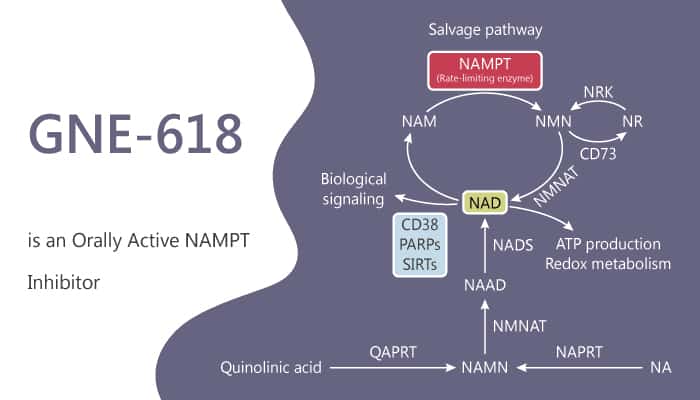Nicotinamide adenine dinucleotide (NAD) is a critical metabolite for a range of cellular reactions. NAD is an essential coenzyme involved in cellular redox reactions and is a substrate for NAD-dependent enzymes. Especially, Nicotinamide phosphoribosyltransferase (Nampt) is an enzyme necessary for NAD synthesis. Nampt catalyzes the rate-limiting step leading to the synthesis of NAD. Moreover, NAMPT catalyzes the condensation of phosphoribosyl pyrophosphate (PRPP) and NAM to generate nicotinamide mononucleotide, a key intermediate in the regeneration of NAD. Nampt plays a critical role in mediating cell survival by inhibiting apoptosis and stimulating autophagic flux in cardiomyocytes. GNE-618 is a potent NAMPT activity inhibitor.
In this study, researchers describe GNE-618, an Nampt inhibitor that depletes NAD and induces cell death in vitro and in vivo. In vitro, GNE-618 inhibits NAMPT in a biochemical assay with an IC50 of 0.006 µM. GNE-618 also reduces levels of NAD with an EC50 of 2.6 nM in the NSCLC cell line Calu-6. GNE-618 inhibits A549 cell growth with an EC50 of 27.2 nM. In vivo, GNE-618 induces tumor growth inhibition (TGI) in an A549 tumor xenograft model. GNE-618 can effectively attenuate tumor growth of the A549 NSCLC xenograft model, and this effect is due to on-target inhibition of NAMPT. In particular, GNE-618 reduces NAD level and is efficacious in a patient-derived tumor xenograft model.

All in all, GNE-618 is a novel small molecule that potently inhibits NAMPT activity and exhibits efficacy in xenograft models of cancer. Furthermore, GNE-618 is efficacious in vivo and reduces tumor growth of a patient-derived tumor xenograft model.